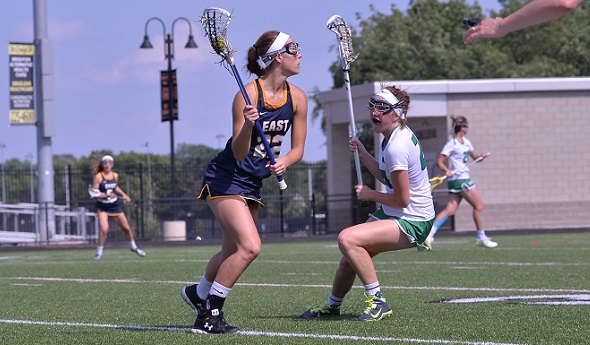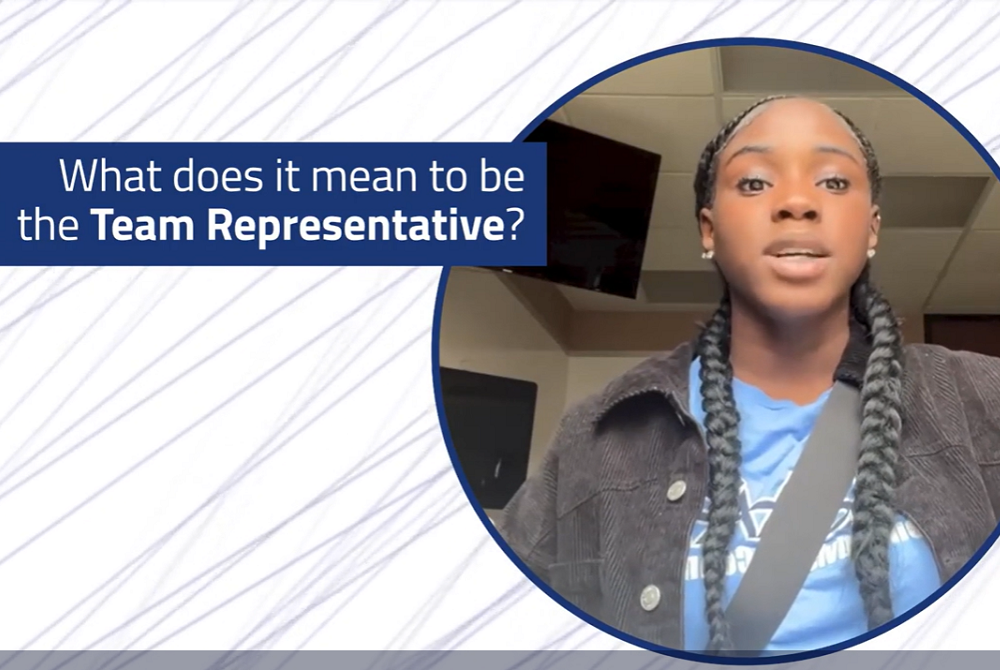
SAC Sounds Off on School Sports
By
Rob Kaminski
MHSAA benchmarks editor
February 17, 2017
By Rob Kaminski
MHSAA benchmarks editor
During a school year in which much of the focus is on, and coming from, student-athletes in Michigan and around the country, what better stage is there on which to showcase the MHSAA Student Advisory Council?
Following are thoughts and opinions from various SAC members as they relate to defining and defending educational athletics.
 Jack Donnelly
Jack Donnelly
Ottawa Lake Whiteford senior
Football, Baseball
Role as a SAC Member: “As an SAC member, I’ve learned a lot about being a good student and good role model for others. I try to bring back the points that I learn from our sessions to the team that I am on; to set a good example for others, especially the underclassmen. I figure if the underclassmen learn it now, it will only help them later.”
School Sports vs. Non-School: “I love the school spirit that things like the ‘Battle of the Fans’ emphasize. School sports should be about spirit and communities.”
Most Enjoyable Aspects: “The best part of high school sports, I feel, is being part of a team and the enjoyment that comes from being a close-knit group. There are lots of guys who I’ve been playing football with now since the third grade. That’s a bond that will last forever.”
 Lindsay Duca
Lindsay Duca
East Grand Rapids senior
Volleyball, Lacrosse
Role as a SAC Member: “Reminding and encouraging my teammates on the field/court as well as my fellow peers in the student section – a unique component of school sports – to cultivate an amicable surrounding for all of those engaging in the competition is a constant duty I perform to help my school emulate MHSAA values.”
School Sports vs. Non-School: “High school sports are played by student-athletes, and the academic component of that title always takes priority. This gives high school sports a healthier and more balanced environment as schoolwork and academic achievement are equally important, something that is entirely disregarded in club, rec, and even often college athletics. Playing for the fun of the game and appreciating each teammate as integral to the success of the team I think are also essential elements of high school sports that make it such a quality and genuine experience.”
Most Enjoyable Aspects: “I love the sense of community that school sports foster, one that can not only be seen around the high school but enveloping the entire town. Playing for the name written on your jersey, one that has been worn and passed down by past players who loved the game just like you, gives you a purpose, a more meaningful sense of belonging and identity than just a kid on a court. That is a pretty special opportunity.”
 Cade Smeznik
Cade Smeznik
Yale senior
Football, Basketball, Baseball
Most Enjoyable Aspects: “I enjoy the fans and intensity of the games. The fans make a real difference in games because when you have a huge crowd cheering you on, you want to give them a good game. The fans can also dictate how a game can go, like in basketball when you have a loud crazy student section, opponents get intimated and it hypes you and your teammates up and can swing the game in your favor.”
School vs. Non-School: “There's no better feeling than playing in front of your hometown under the lights on Friday night or on any night, especially rivalry games or playoff games which bring most of the community together and create such an intense atmosphere you can't help but love it.”
 Sydney Hanson
Sydney Hanson
Alma junior
Cross Country, Basketball, Soccer
Role as a SAC Member: “As a SAC member I feel like it's my job to display myself as a leader in my sports, and support all the other sports. I need to convey a demeanor that motivates my school to follow MHSAA messages. Also, I will try to take opportunities I get to teach students about what MHSAA really is about, because many don't really know what it is.”
Most Enjoyable Aspects: “I most enjoy the team aspect of sports. I love the bond that is created with my teammates and how if you are a close-knit team, it shows in your performance.”
 Hunter Gandee
Hunter Gandee
Temperance Bedford junior
Wrestling
Most Enjoyable Aspects: “I enjoy the bonding between teammates. Bonding that doesn't just happen on the field but also in the classroom, and at other athletic and non-athletic events. I also enjoy the sense of pride for one’s high school and holding up traditions.”
 Marissa Immel
Marissa Immel
Munising senior
Volleyball, Tennis, Basketball, Golf, Track & Field
Most Enjoyable Aspects: “I really enjoy competing and working with my teammates to achieve our goals. I also enjoy meeting new people and making friends with opposing players!”
 Alex Janosi
Alex Janosi
Dexter senior
Swimming, Water Polo
Role as a SAC Member: “I can do a lot by doing the right thing at a high level. By competing at a high level of play, most of the eyes are on such athletes. Doing simple things to show what sports are really about make a big impact on the high school community. From simply shaking someone's hand to running a sportsmanship summit, I can do a lot as a SAC member.”
School Sports vs. Non-School: “I think the big thing is just knowing why you play sports. We play to get energy out and have fun. At the higher levels, it's a job and adds more stress to the player's life.”
Most Enjoyable Aspects: “I enjoy being part of community that supports everyone. It's fun to be able to play for all those people you represent and to know they will be there for you.”
 Darby Dean
Darby Dean
Lowell junior
Football (Fr., Soph.), Soccer, Basketball
Role as a SAC Member: “To deliver the right message to our communities, we need to cultivate a motivated group of students within our communities who have the same thoughts and ideas as to what high school sports offer.”
School Sports vs. Non-School: “A few things that are a part of high school sports that lack in other levels are a sense of investment to a certain activity, the idea of wearing and taking pride in your school and community colors, and civic mindedness. As compared to club sports or recreational sports, I believe high school sports give an opportunity to high schoolers to honor their school and their community colors in something bigger than themselves. Not only that, but it gives the chance for kids to work with kids they have grown up around for the majority of their lives.”
Most Enjoyable Aspects: “Again, I believe one of my favorite parts about high school sports is being able to represent my school and community in something bigger than myself. Also, I believe nothing beats the feeling of winning a big game against a rival with my best friends right on the field with me.”
PHOTO: East Grand Rapids’ Lindsay Duca (22), a member of the MHSAA Student Advisory Council, looks for an open teammate during last season’s Girls Lacrosse Division 2 Final.

MHSAA, NFHS Learning Center Team Up to Provide Online Student Leadership Series
By
Geoff Kimmerly
MHSAA.com senior editor
August 10, 2023
Leadership always has been one of the most valuable and applicable life skills developed by student-athletes participating in educational athletics. To assist in that development, the Michigan High School Athletic Association (MHSAA) and National Federation of State High School Associations (NFHS) have partnered to produce an online Student Leadership series designed to provide the latest research-based instruction to high schoolers throughout the United States.
The Student Leadership series is provided as part of the web-based NFHS Learning Center and includes two free courses focused on students – “Becoming a Leader” and “Leading Others” – with a third installment for coaches currently in production. All three are inspired by the latest research on how youth-aged athletes learn to lead.
This latest work builds on the MHSAA-produced “Captains Course” developed in 2015 with Michigan State University’s Institute for the Study of Youth Sports (ISYS). The “Captains Course” has been taken more than 100,000 times and is based on in-person “Captains Clinics” that MHSAA staff and ISYS conduct with thousands of students across Michigan each year.
Each student-focused segment of the new Student Leadership series takes 30-45 minutes to complete and includes frequent and quick activities designed to help students understand how they would apply leadership skills in real-life scenarios. Course instruction was created primarily in coordination with the MHSAA by a pair of nationally-recognized authorities on the subject: Jed Blanton, an assistant professor in kinesiology, recreation and sport studies at the University of Tennessee; and Scott Pierce, an associate professor in kinesiology and recreation at Illinois State University.
Both Blanton and Pierce have vast experience with youth athletics; both also formerly worked for the Institute for the Study of Youth Sports and served as graduate assistants at the MHSAA during their time at MSU, playing large roles in more than a decade of research conducted through coordination with the MHSAA’s 16-member Student Advisory Council. High school administrators, student leaders, and other researchers and mental performance consultants also contributed to the lessons taught in these courses. The NFHS produced the content, including all of the visuals and digital features, and the student-focused courses went live on the NFHS Learn website in mid-summer.
“We’ve taken a good program, and made it even better,” said MHSAA Assistant Director Andy Frushour, who coordinates the Association’s student services programs. “This is a program we do in person in Michigan, but our reach now is across the country – and these courses are free, hopefully allowing us to contribute to the development of even more student leaders.”
The “Becoming a Leader” course defines leadership styles and builds skills to help students consider themselves as leaders. “Leading Others” details how leaders put those skills into practice including during challenging situations. Blanton and Pierce worked closely with student advisory groups from various states to make the research content relatable to school sports participants. All voices heard in the courses belong to high school students – including athletes from Michigan, Illinois and Washington who provided 30 testimonials that describe leadership in action.
The “Coaches Course” will provide the same information as presented to high school students, but in a way that explains how coaches can use these tools to personalize leadership training among their athletes as they seek to recognize which types of leaders they have on a team, and which types are missing and need to be developed.
“The NFHS is grateful for the opportunity to work with the MHSAA as well as Dr. Blanton and Dr. Pierce,” said Dan Schuster, the NFHS’ director of educational services. “We believe these student leadership courses will provide valuable information across the country and will contribute to the improvement of the interscholastic experience for young people.”
Video previews provide additional information on both Student Leadership courses.Click for direct links to “Becoming a Leader" and “Leading Others.”

